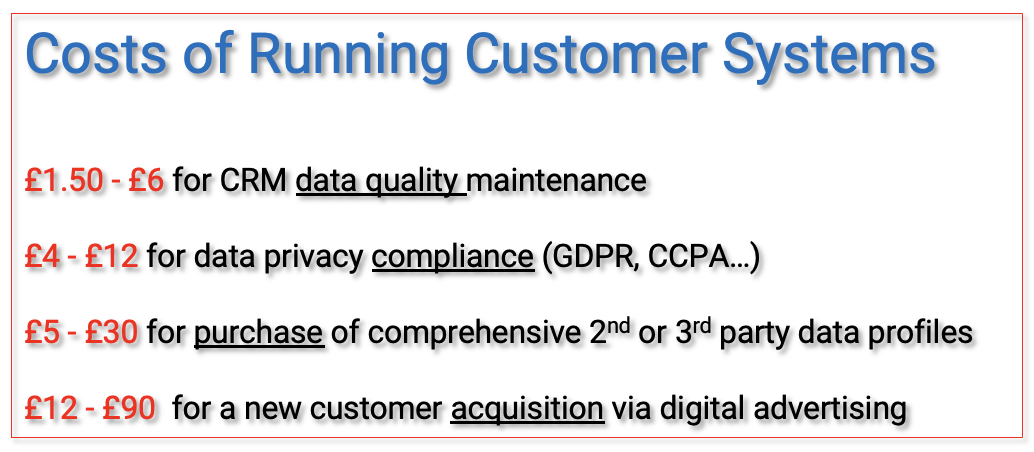The relationship between companies and their customers has always been a delicate dance, but in the digital age, it feels increasingly one-sided. Businesses demand more and more data from individuals, yet struggle to manage it effectively, leading to hidden costs and missed opportunities. This imbalance is creating a critical blind spot, especially with the rise of AI Agents. Let's break down why your current approach to customer data might be holding you back.
In today's market, companies are insatiable in their quest for customer data. We’re all familiar with CRMs designed to capture every interaction, preference, and demographic detail. However, this voracious appetite for information clashes directly with stringent data privacy standards like GDPR and CCPA. These regulations, while crucial for consumer protection, present significant hurdles for organisations trying to maintain compliance. The reality is that many companies are pouring money into data collection without truly understanding the quality or utility of what they're acquiring.
The emergence of AI Agents promises a revolution in customer interaction, offering personalised experiences and automated support. But there's a critical catch: AI Agents demand high-quality, accurate data to function effectively.
As stated by Salesforce CTO & DCX Innovation Director at Capgemini UK, Matthew Morris, "Every Salesforce customer is about to rewire their business processes. Whether your org is 2 years old or 20, it's full of assumptions that won't survive the AI era. Before you can transform, you need to understand what you've got".
Without this foundational understanding and clean data, deploying AI Agents is akin to building a house on sand. Companies are quick to cite poor data quality as the number one reason they're hesitant to deploy AI Agents.
According to a recent report by Gartner, 60% of organizations cite 'poor data quality' as a primary barrier to adopting AI, and 50% of enterprise data remains unstructured or inaccessible." Jan Stihec, Director of Data and Generative AI at Shelf, states that "Data quality is the number one barrier preventing GenAI success." Qlik research found that "81% of companies still struggle with AI data quality, putting ROI of AI investments and business stability at risk."
They recognize that "your mess for less" is a recipe for disaster, risking brand trust and customer dissatisfaction. AI Agents, unlike human agents, lack the "gut-feel" to question inconsistent data and will simply act on what they're fed. This means that if your underlying data is flawed, your AI Agent will only accelerate poor processes, leading to an even worse customer experience.
The cost of getting clean data is surprisingly high. In our team we have over 100 combined 'person-years' in building, managing and using large scale customer management systems. In our experience, across many business cases in many sectors, organisations currently spend (annually, per customer record):

Further drill downs on these costs are shown in Sources below.
Could customer-side agents, where the individual controls their own data and the flow of it to organisations, be the solution? The individual gains because they are in control of their data, but also have the power of an agent that can deal with their trusted “suppliers” - car, house, insurance, travel, finance, health. But the agent can go beyond password management and data quality. Customer-side agents can execute tasks - book a car service, or shop for the cheapest flight tickets.
Clearly there are benefits for the organisations. They have good quality data, managed by the individual, and a tighter, more trusted relationship. We’ve estimated that the savings for the organization are more than 65% of the cost of every customer record, and this adds up - £18 per record per year. Every year.
This will drive the future of customer-side agents working on our behalf as individuals, because both the organisation and the individual win.
SOURCES
1. GDPR / Data Privacy Compliance Costs
Cost Element
Amount
Source
ICO annual fee (large orgs)
£3,763
GDPR implementation – medium business
~£20,000
New Economics Foundation (NEF), 2020
GDPR implementation – large business
~£163,000+ (core setup only)
GDPR implementation – £1–10m+ (full)
Common for large orgs
Annual GDPR compliance – £860k–£8.6m
Ongoing large org spend
% of IT/security budget for GDPR
≈10%
2. CRM Data Quality Maintenance Costs
Cost Element
Amount / Estimate
Source
Cost of poor data: 15–25% of revenue
£15–£125 per customer/year
Cost per bad record
$10–$100
Time spent on correcting data
~50% of staff time
CRM software licensing
£12–£250+/user/month
Hidden CRM data cleaning/maintenance
Staff time + integration upkeep
Cost-saving from maintenance
Up to 80% of bad data cost saved
Derived from industry benchmarks and referenced by Fullcast/Plauti
3. Summary Table
Cost Type
Medium Business (per customer) Large Business (per customer)
GDPR Compliance £1.00. £0.10–£1.00
CRM Data Quality (good) £7–£30. £4–£20
CRM Data Quality (bad) £15–£125 (lost revenue). £15–£125 (lost revenue)